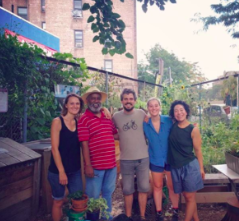Solidaritat: What Barcelona’s Social and Solidarity Economy Means for NYC
 At the end of June, activists from Mexico, the United States, and Canada gathered at the Fearless Cities Conference—North America’s first ever municipalist summit—to discuss local strategies to build a more just, democratic, and inclusive economy from the ground up. CEANYC participated in the Solidarity Economy track, exchanging with and learning from cooperators around the world, including Laurent Levesque of Montreal’s Chantier and Alvaro Porro, Barcelona’s new Commissioner of Social Economy (yes, this is a government position that exists in Barcelona!). We are honored to have gotten to spend extended time learning more about Barcelona’s solidarity economy, and are eager to share the information and lessons learned with our fellow New Yorkers.
At the end of June, activists from Mexico, the United States, and Canada gathered at the Fearless Cities Conference—North America’s first ever municipalist summit—to discuss local strategies to build a more just, democratic, and inclusive economy from the ground up. CEANYC participated in the Solidarity Economy track, exchanging with and learning from cooperators around the world, including Laurent Levesque of Montreal’s Chantier and Alvaro Porro, Barcelona’s new Commissioner of Social Economy (yes, this is a government position that exists in Barcelona!). We are honored to have gotten to spend extended time learning more about Barcelona’s solidarity economy, and are eager to share the information and lessons learned with our fellow New Yorkers.
Over the past four years, with the election of Ada Colau—the city’s first woman mayor—alongside several other activists, Barcelona has experienced a significant shift Left in their local governance. Many people who have spent their lives fighting economic inequality at the grassroots level—squatters, housing organizers, food justice activists—now hold government offices, leveraging the City’s resources to build a Social (or Solidarity) Economy. Barcelona has established a citywide agency devoted to strengthening collective ownership and democratic governance, something New Yorkers have been dreaming up for years. The new agency currently employs 22 people committed to working on social and solidarity economy growth (whereas there were previously 0), awards 16 million euros over a span of 4 years to solidarity economy groups on the ground, and allots 8 million euros for capital projects. The agency is working towards procurement as well as developing worker-owned businesses among Barcelona’s most marginalized.
 In spending time with Porro and other New York groups invested in a citywide agency—New Economy Project, New York City Network of Worker Cooperatives, New York City Community Land Initiative—we got the chance to hear more about the solidarity economy landscape in Barcelona and how the office functions. This information is not only exciting, but also useful in reflecting on the landscape of NYC considering the scale of Barcelona’s social economy: 1,197 worker-owned enterprises, 861 cooperatives, 260 community-economic initiatives, and 2,400 third social sector (similar to non-profits) organizations. The cooperatives exist in all sectors and work towards the transformative aim of democratic and participatory management, orientation towards people’s needs, and commitment to the community.
In spending time with Porro and other New York groups invested in a citywide agency—New Economy Project, New York City Network of Worker Cooperatives, New York City Community Land Initiative—we got the chance to hear more about the solidarity economy landscape in Barcelona and how the office functions. This information is not only exciting, but also useful in reflecting on the landscape of NYC considering the scale of Barcelona’s social economy: 1,197 worker-owned enterprises, 861 cooperatives, 260 community-economic initiatives, and 2,400 third social sector (similar to non-profits) organizations. The cooperatives exist in all sectors and work towards the transformative aim of democratic and participatory management, orientation towards people’s needs, and commitment to the community.
Here are some key takeaways:
- Barcelona has certain major distinctions from New York City: stronger social welfare benefits, cultural familiarity with and prevalence of ‘ethical banks’ as a legitimate financing option, less racial and ethnic diversity.
- Increased electoral power brings increased demonization of left-leaning and cooperative goals.
- Cooperatives and solidarity economy enterprises are a means to an end, not the end, and any and all initiatives strengthening them can not be held solely within government agencies. This means building inside and outside power that is aligned yet sufficiently independent from government.
- Strengthening the solidarity economy is an intergenerational project; we need engaged and eager youth as well as the wisdom and expertise of our elders
- Advancement of a more just, equitable, and democratic economy must be cross-sectoral and include groups across spheres with shared values and goals.
Here are some questions that remain:
- What mechanisms can we put in place to ensure that our government agencies are accountable to the grassroots leadership of the solidarity economy in NYC?
- How can we build electoral power amongst the working class women of color who comprise the majority of NYC’s solidarity economy?
- What partnerships need to be in place for a cross-sectoral government agency to be successful over the long term?
Thank you to Movement Net Lab for organizing Fearless Cities, and to New Economy Project for hosting Alvaro Porro! For more information, check out Barcelona’s Impetus Plan for the Social and Solidarity Economy, this piece on municipalism in Spain from Rosa Luxemberg, and Masha Gessen’s recent New Yorker article on radical democracy in Spain.

